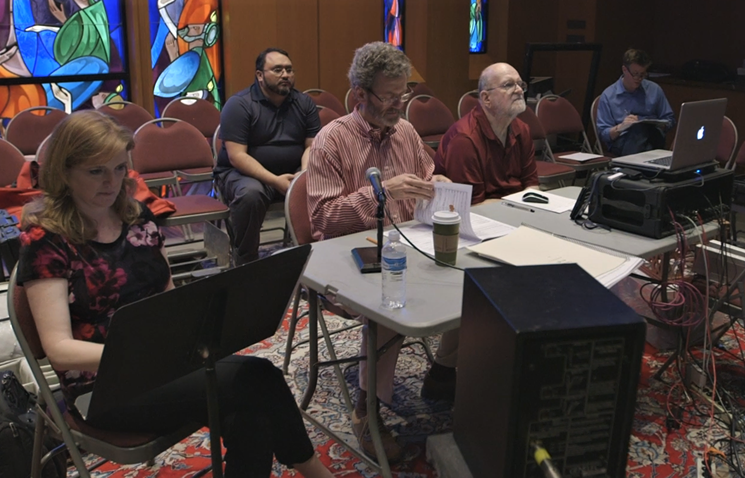
Fresh off releasing its debut album, Visions Take Flight, ROCO’s recording’s producer Blanton Alspaugh earned a nomination from Grammy voters in the “Producer of the Year, Classical” category. The album was conducted by the Houston-based chamber orchestra’s artistic partner Mei-Ann Chen, and the gratitude marks Alspaugh’s ninth nomination in the category and his 22nd nomination overall.
ROCO isn’t playing around — and they’ve got the street cred to prove it. Fresh off releasing its debut album, Visions Take Flight, ROCO’s recording producer Blanton Alspaugh earned a nomination from Grammy voters in the “Producer of the Year, Classical” category. The album was conducted by the Houston-based chamber orchestra’s artistic partner Mei-Ann Chen, and the gratitude marks Alspaugh’s ninth nomination in the category and his 22nd nomination overall.
There’s no case of the Susan Lucci curse with this Grammy nominee. Alspaugh has claimed seven previous titles at the Grammy’s, and he is gunning for the next piece of hardware for his trophy case. But like a true sport, he stays modest about his awards.
“I’ve been extremely fortunate. I’ve won the Grammy a couple times, most recently this past February. The thing that I always remind people when they ask me about it is it’s an award for not playing or singing anything. It’s for what a producer does,” he said. “We help artists make good recordings. It’s entirely collaborative. It’s all about collaborating in an intensive way with players and singers and conductors, and helping them perform beautifully.”
A producer’s job is not always easy to describe off the bat, but Alspaugh sums it up succinctly.
“In the classical field, the producer has in front of him or her the score or scores for the pieces to be done. They are the musical supervisor, adviser, mentor and conscience of the project. I’ve got the score in front of me, and I’m listening in the control room while ROCO plays these pieces in the church, and I’m making notes in the score of what needs to be improved,” he said.
“The recording sessions are a process of them playing, me taking notes, and sometimes I’ll stop them to go back and rehearse. I give them specific things, like a unison that might [need] to be better in tune…all the things musicians work on to refine their performance and render the score the way the producer intended. It’s listening, and providing feedback, and that’s one of the key elements of what a producer does. It’s collaborative leadership. The conductor is the leader, but the producer is the second set of ears for the conductors.”
Being a producer also provides for some of the more mundane, yet important, tasks that go into making an album.
“Typically, the producer is also involved in the planning of when and where the recording will take place. It could be selecting the right location. With classical projects, the recording a lot of times doesn’t happen where the ensemble plays their regular concerts. For ROCO, it was at St. John the Divine,” Alspaugh said. “We had to evaluate the church for the recording. It was situated at the intersection of a major thoroughfare, so we had to spend an hour or so listening and noting any traffic noise. We noted when city buses passed by or cars passed by. We worked with ROCO on the schedule, talking with them about how many minutes of music there is to be recorded and how many hours of session time we need to get a good recording.”
In the end, the recording earned the nod of approval from industry peers.

Step by step, Blanton Alspaugh (center) and the team at ROCO work their way through the recording of Visions Take Flight. Photo by Blueprint Film Co
The album, which was released in November 2018, features six works collectively chosen by ROCO’s musicians from the ensemble’s long list of commissions spanning their 15-year existence, including Karim Al-Zand’s haunting “Visions from Another World” (2008), Reena Esmail’s pulsing, unpredictable “Teen Murti” (2013), Derek Bermel’s tender, 2015 commission “Murmurations,” Anthony DiLorenzo’s whimsical “Jabberwocky” (2014), Marcus Maroney’s Bartók-inspired “Concerto for Chamber Orchestra” (2016), and Anthony DiLorenzo’s, “Anthem of Hope: Houston Strong,” which was commissioned in 2017 in honor of Houston’s resolve following the destruction of Hurricane Harvey.
Grammy nominations are a process that take several months to consolidate. First, there’s the rigmarole of selecting the candidates. Ballots are sent to Grammy-voting musicians, song writers, performers and other members who have a hand in the music industry. From there, the voting creates a field of around 50 selected people/groups for each category. That field of 50 has, by this point, earned the title of “Grammy Recognized.” Out of those 50, a select five people/organizations are chosen as the cream of the crop from those votes. From there, those five few are labeled “Grammy Nominated.” Then, just like we learned in Highlander, there can only be one. One candidate emerges victorious, all for the process to begin anew the next year.
Win, lose or draw, Alspaugh gives the credit to the creative types who make his job much easier.
“I really do have to look at these times I’ve been nominated and won as a producer and remember that it’s the players and singers and composers who made the music,” he said. “It may be me getting the recognition, but it’s the result of the artists’ work.”
The 62nd Grammy Awards air January 26 on CBS, when the adoring fans will find out the winners for each of the 84 categories.
For more information about ROCO or to buy the album, visit roco.org. The album is available at iTunes, Amazon, Google Play and other retailers.
Source: ROCO’s Debut Album Visions Take Flight Earns Grammy Nod

Leave A Reply